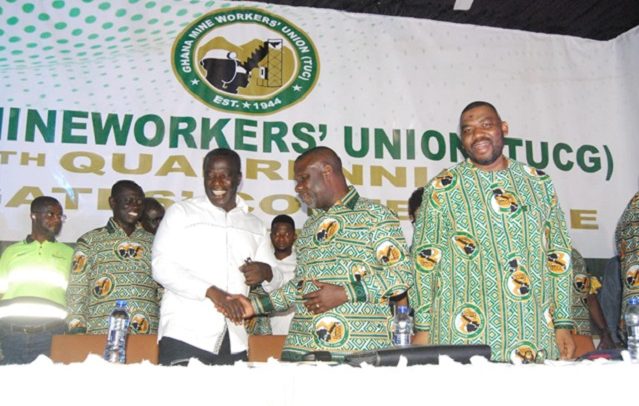From L: Ignatius Baffour-Awuah in a handshake with Mensah Kwarko Gyakari as Abdul-Moomin Gbana looks on
The Ghana Mines Workers Union (GMWU) has lamented the current non-standard forms of employment within the mining industry of the country.
According to GMWU, employment forms such as temporary work, casualization, fixed term contract work are gradually taking over from the standard form which is permanent employment.
This trend, buttressed by a study undertaken by the Union which revealed that about 90 percent of the workforce in the mining sector is currently engaged in non-standard forms of employment, is causing job insecurity in the mining sector, the Union indicated.
This was disclosed at the GMWU 13th Quadrennial Delegates Conference in Obuasi, on the theme, “Building Trade Union Resilience in a Rapidly Changing World of Work: Strategies for 2024 and Beyond”.
GMWU General Secretary, Abdul-Moomin Gbana, who raised the concern said the development has led to ‘lower levels of employment protection and high degree of uncertainty’.
“There has been a surge in workers and Trade Union rights violation, a shrinking collectively bargaining coverage, job insecurity, threatening social protection cover, and fluctuation in income and pensions,” he added.
The Union observed that while businesses get rid of previous commitments to employees, they turn to hire same skilled employees under highly unfavorable terms and conditions.
“Regrettably, this phenomenon continues to be exacerbated by the wanton fragmentation of production and outsourcing arrangements by mining companies resulting in the further fragmentation of work, the rise of non-standard forms of employment, and the further individualization of labour and employment relations,” Mr. Gbana asserted.
He therefore called on stakeholders within the industrial relations space to engage in finding ways to curtail the disturbing situation and ensure employment protection for workers in the mining sector.
The National Chairman of the GMWU of TUCG, Kwarko Mensah Gyakari said the government must initiate strategies to reap more from mining given that the country’s mineral resources are finite.
He expressed worry that the country was not getting much from mining even though mining had been undertaken for the past 120 years.
“What are we going to show to our future generation? What have we achieved with these resources we have mined in Ghana, especially in Obuasi for more than 120 years? What can we point out to show what Obuasi Mine has been able to achieve for the people in Obuasi Community” he quizzed.
TUCG Secretary General, Dr Yaw Baah, in his solidarity message, said the COVID-19 pandemic had hurt the economy, the lives of workers, and their family members.
He said many mineworkers either lost their jobs or had their permanent contracts changed to fixed-term contracts thereby affecting the quality and security of their jobs and the security of their incomes.
“Despite all the challenges, the GMWU stood its ground and defended the rights and interests of its members and the union remains one of the strongest unions in the TUC Family, not only in terms of financial contribution to TUC but also in terms of the contribution of their leaders to decisions at the TUC, thereby continuing the tradition established by former leaders of GMWU,” Dr Baah stated.
The Minister of Employment and Labour Relations, Ignatius Baffuor Awuah commended the Union for its contribution to towards the development of the country.
He assured the Union that the Government would continue to give priority to trade unions including the Ghana Mineworkers’ Union to contribute their quota towards national development.
By Jamila Akweley Okertchiri


